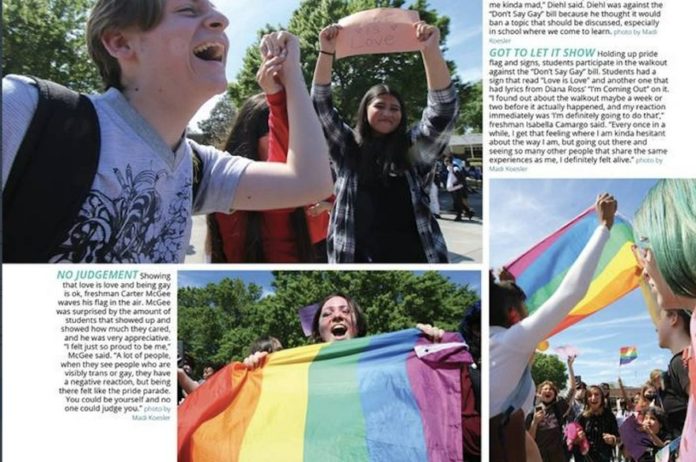Yearbooks from Lyman High School in Florida are on hold after the editors included photos of students protesting the state’s Parental Rights in Education law.
School district officials are concerned that the pages imply that the school endorsed the protests and are looking into options for what to do, since the copies have already been printed.
The bill, deceptively nicknamed “Don’t Say Gay,” prohibits teaching students in 3rd grade and below about “gender identity” and sexual orientation.
Lyman High School Principal Michael Hunter said in a statement on Monday that he wishes school officials had caught the issue prior to going to print. Instead of reprinting yearbooks with new pages, they have opted to use stickers to edit the pages.
“Rather than reprinting the yearbook at substantial cost and delay, we have elected to cover that material that is out of compliance with board policy so that yearbooks can be distributed as soon as possible,” the principal’s statement said.
Seminole County Public Schools spokesman Michael Lawrence told News 4 Jax that “the issue wasn’t with the protest but how its depiction in the yearbook could be interpreted as being endorsed by the school, which would be in violation of the school board’s policy.”
“The issue at hand here is not the photos or the topic for which the students were protesting,” Lawrence said. “If these items were caught earlier prior to print, some simple editing/tweaking likely could’ve occurred to make that section in compliance prior to print.”
When the station asked what changes could have been made, Lawrence said, “specifically making it clear that this particular event was a ‘student’-led event that was not sponsored, endorsed, or promoted by the district or school would’ve solved the issue.”
The yearbook’s faculty advisor Danielle Pomeranz told the Orlando Sentinel it would cost $45,000 to reprint the 600 yearbooks.
The students who created the pages are calling the stickers “censorship.”
“This really shouldn’t be happening because all we did as journalists was document what was happening at our school on our campus,” Skye Tiedemann, one of the yearbook’s editors-in-chief, told the Sentinel. “To have that covered up isn’t right. … This is censorship.”



